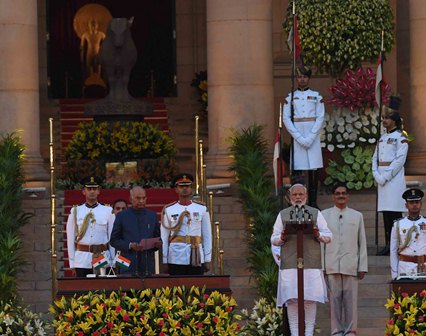Explaining the Modi wave in the 2019 Lok Sabha Elections
Modi is the first BJP Prime Minister who occupies the high office consecutively for the second time. It is the Modi factor in the election that decisively played for BJP’s massive victory in the states.

More than anything else, the 2019 Lok Sabha elections in the world’s largest democracy was about “Modi”. India recently elected new MPs (Members of Parliament) for the next five years who will represent the voice of Indians and are expected to lead India on the path towards greater development and sustainability. Prime Minister Narendra Modi is now re-elected for his second tenure and represents India on all global platforms.
However, why were these elections historic or so impactful? The most important thing that this election has perhaps conveyed us is that ‘alliance calculations’ failed miserably and instead ‘leadership’ has grown to be an utmost important factor in deciding the outcome. It is beyond any doubt that India has one of the most charismatic and influential leader as its Prime Minister. But it is for the first time that “leadership” of PM Narendra Modi has won not just many seats in the Lok Sabha but also won the hearts of many Indians irrespective of the barriers of caste, class and community. Talking about the ‘alliance failure’, particularly in Uttar Pradesh, despite SP-BSP alliance, BJP managed to perform exceptionally well. So the question that arises is why alliance failed? The answer is that despite different parties have come together with a purpose of defeating BJP, the parties have miserably failed to connect with the people on the ground and also because each party chief in an alliance had their own vested interests in spite of collective intention.
Also read:When National Security is at stake, should India’s narrative be War or Peace?
Evenin states like Madhya Pradesh, Rajasthan and Chhattisgarh, where non-BJP governments came up a few months back, they have failed to gain popular consent of the people and have lost in the Lok Sabha elections of 2019. These trends have one common thing and that is the ‘Modi wave’. According to the survey conducted by Centre for the Study of Developing Societies (CSDS), many people in different states openly admitted that they voted for BJP because of Narendra Modi. If this be the reason, one is definitely awe-struck with the aura of PM Modi that has been one of the most important and decisive factor in ensuring a full-fledged second term to the BJP.
The Tsu-Namo wave has swept across the country with BJP making strong hold over many states in India.
The Northern and Western India has been welcoming the wave with the open arms while in the east, BJP seems to be expanding its influence. In South, except Karnataka, the influence of Modi was not seen elsewhere. Therefore, from all the above facts, there are certain conclusions and analysis that seems to answer few of the many unanswered questions arising out of the recent elections.
The first question is: what have been the causes for the failure of regional and national parties like Congress? There are many reasons but some of the primary ones include inability to connect with people, lack of developmental issues in their agendas or manifestos, lack of a bigger goal concerning India’s development rather than just defeating BJP, the unintelligent alliance calculations, and last but not the least, the dynasty politics. Since we have seen ‘leadership’ does matter a lot, so the national parties like Congress should rise above “Dynasty politics” and come up with a viable option in 2024.
Also read:What could be the public agenda for the Modi 2.0 government?
The second and perhaps the most important question is: what factors have accounted for BJP’s huge victory in 2019 elections? Well, importantly all the reasons listed above which have accounted for the opposition’s defeat are perhaps the factors responsible for BJP’s landmark victory. Over the last five years since 2014, Modi and his government have worked relentlessly in working for India’s development by connecting with people from both rural and urban areas through various schemes and policies. Amit Shah, the party chief has had made full-fledged developmental strategy and goals for increasing its vote bank, particularly in states like Uttar Pradesh. Last but not the least, it was the Modi-factor that acted as a catalyst and his oratory skills and charisma swayed across the country and have been majorly responsible for building the trust of Indians and that is the reason that Indians voted whole-heartedly and the results speak the rest.
Well, “sabka sath, sabka vikas” and now “sabka vishwas” has earned respect, love and trust for not just PM Modi but also his party. It’s the right time, when the party holds such a huge majority in the Lok Sabha that it should strive each and every moment for working in the direction of India’s development and if that be the case, it’s not very far when India shall embark on the road towards becoming a global power in the years to come.
